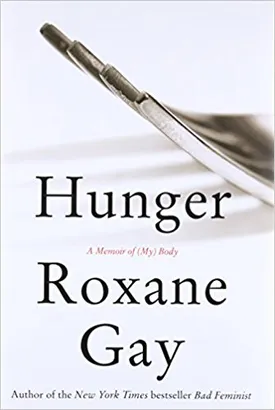Hunger: A Memoir of (My) Body by Roxane Gay
Roxane Gay’s intense, emotionally charged memoir Hunger: A Memoir of (My) Body offers an honest and poignant narrative of her experiences with body image, weight, and food. Although her words are straightforward and often painful, they are also filled with introspection and understanding. This powerful story takes readers on an exploration into Gay’s childhood, her adulthood, and the discrimination and trauma she has faced.
In the early pages of Hunger, Gay speaks of her childhood in Omaha, Nebraska and the pivotal moment that would shape the rest of her life. After being gang-raped as a twelve-year-old, she spent the next decade consumed with shame and depression. To conceal her pain, she resorted to eating whatever she could get her hands on to put a barrier between herself and the world. As she progressed through adolescence and into adulthood, she never came to terms with her body and her health, instead pretending it did not matter.
In the memoir, Gay does not shy away from the experiences that have led her to become overweight on the brink of obesity. She tackles her own assumptions about what it means to be overweight as well as her wrestling with her relationship towards food and her own body. What sets this memoir apart from many other books about body image is Gay’s willingness to delve into the true range of emotions associated with fatness, addressing the complicated feelings that eating disorder patients face with “sinful” foods, the “forgiveness” of overeating, the anger she has felt with coworkers who have commented on her size and appearance, and even attending a Weight Watchers meeting while maintaining an awareness of the oppression of fat people.
One of Hunger’s unique facets is the way in which it acknowledges the structures of oppression which are embedded in our society and how they shape our lived experiences. Gay explores intersectionality, understanding the experiences of being female and black, along with being fat and queer, and how her body has been the subject of mocking and judgment throughout her life. By sharing her experiences of gender discrimination, racism, and sexism, Gay sheds light on the experiences of many marginalized people and how the experiences of fatness often fit into a larger conversation of discrimination and struggles for liberation.
Ultimately, Hunger explores the complexities of our society and its epidemic of fatphobia through the story of one woman. Gay does not offer any easy answers to this problem but rather a challenging, yet incredibly necessary dialogue about how we can foster acceptance for all bodies and rebuild our trust in our own skin. Hunger is a must-read for anyone who has struggled with similar issues, as well as those searching for understanding, validation and hope.

